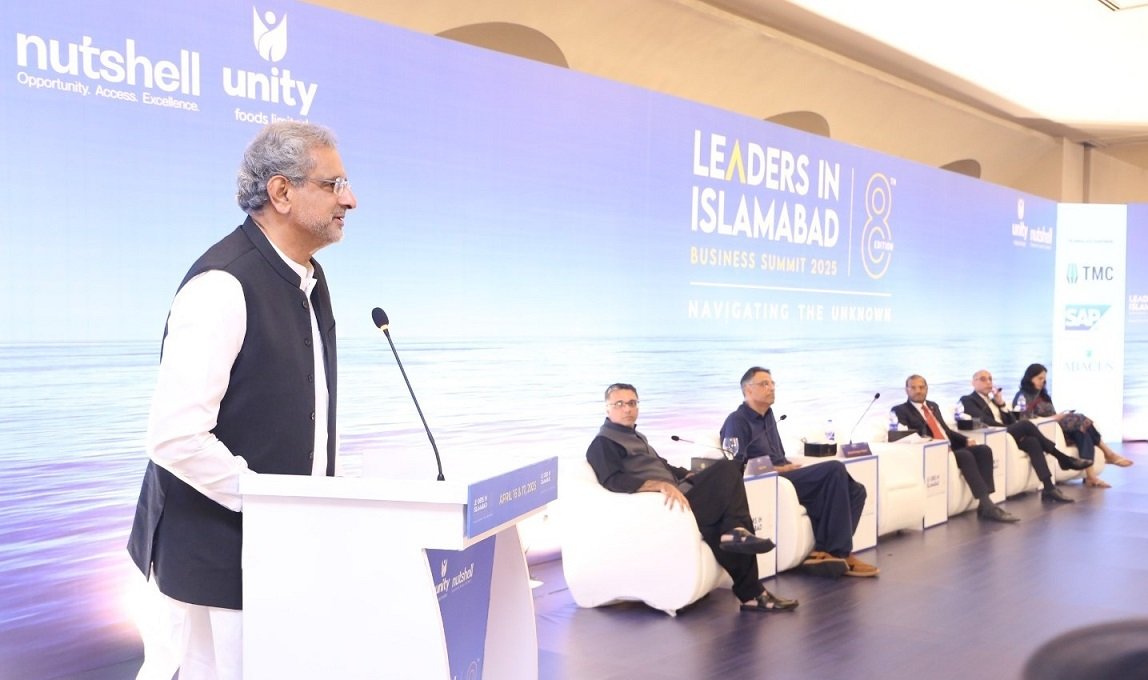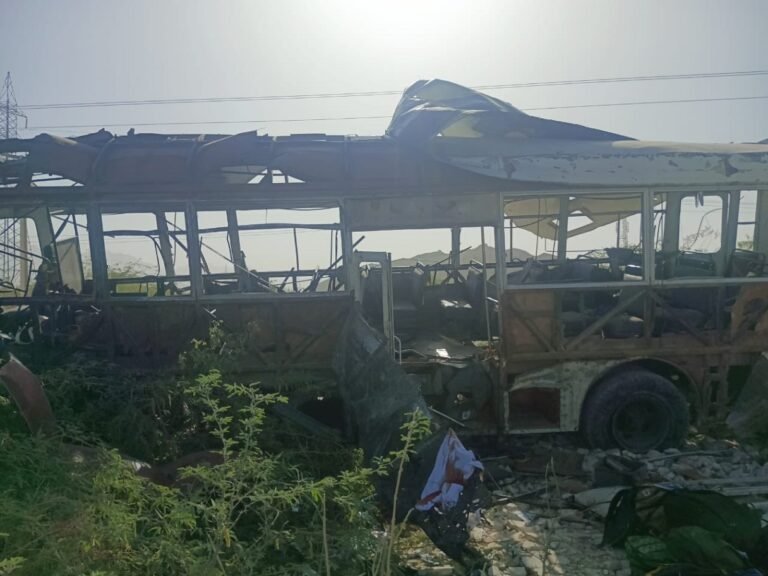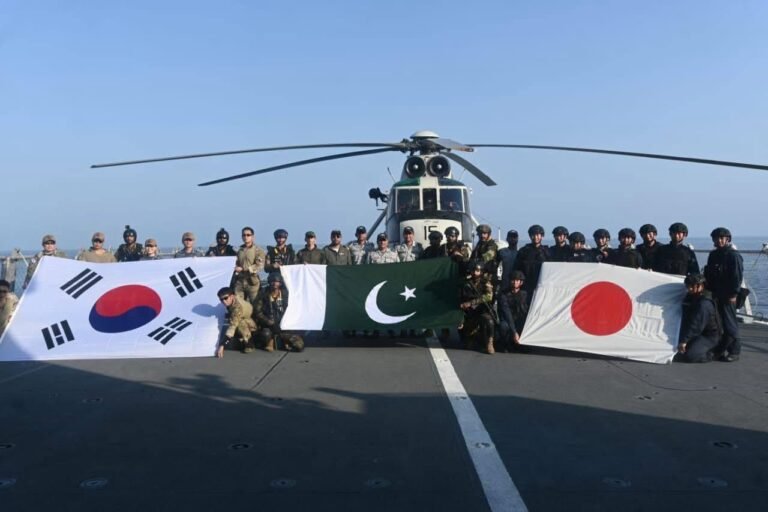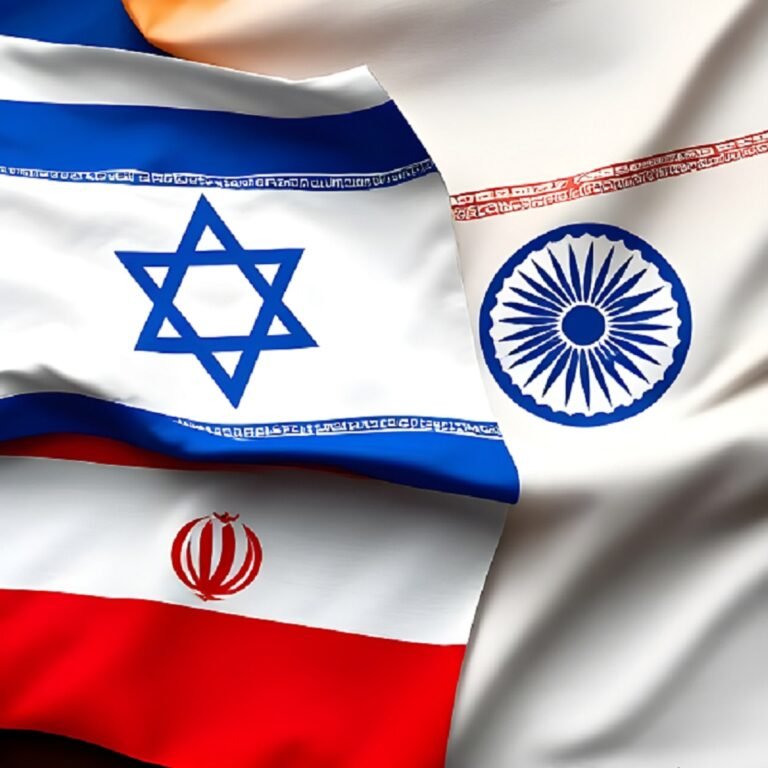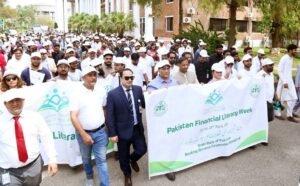The sAt this point, Shahid Khaqan Abbasi, former Prime Minister of Pakistan, reinforced the need for stability and continuity of policies, with a focus on the need for privatization.
UK Keen to Expand Investment in Pakistan: British High Commissioner Jane Marriott
LIIBS 2025 Offers Powerful Commitments to Innovation & Economic Resilience as it came to a powerful close with globally recognized leaders, policy makers, experts, and thousand plus delegates. The participants were deliberating on unified approach, consistency of reform, technology and investment landscape, for Pakistan.
Former Prime Minister of Pakistan Mr. Shahid Khaqan Abbasi reinforced the need for stability and continuity of policies, with a focus on the need for privatization. “Weak regulation has massively contributed to increasing circular debt, and loss of investments. Stability and rule of law are a must to take any step in the future.”
Pakistan’s former Minister for Finance, Planning & Development Mr. Asad Umar stressed on the construct of true democracies and insisted that Pakistan needs to strengthen its institutions, “The entire nation seems to be in conflict. Pakistan needs to abide by systems. As a multi-ethnic country, Pakistan must prioritize local governance.”
LIIBS: Towards a Collective Objective
Mr. Sohail Aman, Pakistan’s Chief of Air Staff (2015-2018) & Chief Executive Strategic Engagements, Nutshell Group, provided the lasting message that summed up the two days of conference and created a perfect hook for the next, “Pakistan belongs to us all, and the Constitution is sovereign. Our collective objective is to see Pakistan great, and we will continue navigating the unknown for newer opportunities.”
Earlier in the day, global and local leaders converged in a series of high-impact sessions on digital futures, resilient ecosystems, hidden markets, and economic transformation.
British High Commissioner to Pakistan, Ms. Jane Marriott, said that the United Kingdom is eager to expand investment in Pakistan and views its strategic partnership with Pakistan as “two sides of the same coin.” Speaking at the 8th Leaders in Islamabad Business Summit 2025, Marriott expressed gratitude for being part of a platform that brings together “brilliant minds and meaningful conversations focused on impactful solutions.”

Trade Volume Between United Kingdom and Pakistan
She said the UK is currently the world’s largest provider of financial services, the second-largest business services provider, and the third-largest global economy. Highlighting the strength of bilateral trade, she noted, “Pakistan and the UK have a trade volume of £4.4 billion, which we aim to increase to £10 billion in the near future.” The High Commissioner emphasized that the UK is already investing across key sectors in Pakistan, including health, education, and engineering. “Pakistan is a young country brimming with potential. With mutual collaboration, its economy can reach $2 trillion,” she said.
Ms. Marriott shared that the UK is working on a $45 million macroeconomic reform program in Pakistan and is investing in clean and green energy reforms in the power sector. She also pointed to British cooperation in engineering, including the Reko Diq project, and reaffirmed full support in tackling climate change.
Best Practices of Leading Digital Economies
LIIBS 2025 Offers Powerful Commitments to Innovation & Economic Resilience. The following addresses encapsulated the best practices of leading digital economies; Mr. Michael Foley, Advisor, Watu Global, highlighted African Experience in Bridging the Digital Divide. Building on inclusivity in digitalization and talking of data for women and informal workers in Pakistan, he said, “Affordability is still a challenge, and private sector-led initiatives are critical to build Pakistan as a digital economy.”
Prof. Michael Sung, Chairman, CarbonBlue Innovations & HorizenDigital and Founding Director, Institute of Digital Finance Innovation, Zhejiang International Business School Topic, continued in the same stream with a focus on the transformational potential of digital finance, “We are entering the age of programmable economies – The focus must be on the interoperability of these currencies as they sit on silo ecosystems.”
Mr. Maz Hussain, Partner, Digital Lighthouse Leader, KPMG Saudi Arabia, shared, “Pakistan has immense potential for IT hubs – creating blueprints to harness the power of AI and drive digital transformation. Enable innovation, embed intelligence, and evolve endlessly.”
Future of Asia in Digital Age
Relevant to the theme of the conference were the immediate steps too, and in the following panel discussion titled, What Matters Now. Mr. Saquib Ahmad, Country Managing Director, SAP Pakistan, Iraq, Afghanistan & Bahrain, being the moderator put forward some very profound questions regarding the future of Asian countries in the digital age.
Mr. Burak Ozer, Group Chief Financial Officer, VEON, a global digital operator with a presence in six frontier markets, stated that their subsidiary Jazz has invested over USD 10.9 billion in Pakistan to strengthen the country’s digital ecosystem. Emphasizing the VEON Group’s investment portfolio for Pakistan, he highlighted the asset-light strategy to grow as a services-oriented company to transform Pakistan’s digital landscape. He stated, “Jazz’s direct digital revenue, which now exceeds 25%, reflects the success of the Group’s Digital Operator 1440 strategy.
By addressing previously unmet customer needs in critical areas such as healthcare, financial services, education, and entertainment, we will continue to deliver essential digital solutions tailored to evolving demands. This approach is not only beneficial for our customers and the economy as a whole but also supports sustainable business growth.”
Technology Opportunities for Pakistan
Mr. Brenden McKittrick, CEO, Internet of Aviation & Chairman, AeroBloc, added, “The technology opportunities for a country like Pakistan, are immense; the youth, the eagerness and the enthusiasm to grow, most favorable.” Additionally, Mr. Abdul Haseeb, Managing Director, TMC Private Limited, said, “The skillset required for AI will change drastically, and will require more problem solvers and critical thinkers then coders.” Further, Mr. Usman Asif, Founder & CEO, Devsinc, stated, “With AI we have to realize that we need to enable our engineers to think ahead of the curve, and the curve is AI.”
Moreover, Mr. Saqib Ahmad Khan, Country General Manager, GBM, noted, “We need to give confidence to the user and train them to use these tools. Organizations must be ready, and the teams should be prepared for global competition.” Mr. Asif Ahmad, Group Chief Business Solutions Officer, PTCL Group, concluded, “We need to give confidence to the user and train them to use these tools and organizations must be prepared for global competition.”
The Symphony of Ecosystems
The following session mystifyingly titled The Symphony of Ecosystems, moderated by Mr. Mujeeb Zahur, Managing Director, S&P Global Pakistan, began with a synopsis of conversations held so far, and how they stand to impact global trade, and specific industries geopolitical and macroeconomic context. At this point, Mr. Jahangir Piracha, Managing Director & CEO, Fauji Fertilizer Company Limited, stated, “As agricultural input manufacturers committed to feeding 40 million people across 55 million acres of land, we see technology as a powerful disruptor – reshaping the future of food security in Pakistan.”
The speakers included Mr. Jahanzeb Khan, President & CEO, easypaisa digital bank. He emphasized financial inclusion, stating, “We are talking about leveraging AI for hyper-personalization, to prevent fraud and digital scams, and enhance operational efficiencies.” Mr. Asif Peer, CEO & Managing Director, Systems Limited, said, “Leaders need to be prepared for disruption, there will be changes but organizations in Pakistan need to be prepared for opportunities.” Ms. Fatima Asad-Said, Chief Executive Officer, Abacus, added, “Orchestrating talent is not about competition but collaboration. We should be creating a symphony where tech innovators, business leaders, and government work together through sustainable policies, relationships, and public-private partnerships to achieve holistic success.”
Pakistan: Digital Financial Inclusion
Mr. Haaris M. Chaudhary, President & CEO, Mobilink Microfinance Bank Limited, reflected, “We are building an ecosystem for digital financial inclusion, as we process 120 thousand microloans every day, which enables small businesses and individuals.”
Taking the point further, Mr. Abrar Mir, Chief Information & Transformation Officer, HBL, said, “With AI, real-time data is available for real-time loans, real-time investments, real-time insurance capabilities, and the potential is immense if all of this is happening across the entire value chain.”
The session, Forgotten Markets, moderated by Mr. Usman Yousuf, Director, Nutshell Communications and Chairman, ProPakistani, Regional Entrepreneur & Investor, featured emerging voices on untapped potential. Mr. Abu Bakar, CEO, Pakistan Software Export Board (PSEB), stated, “Pakistan’s IT sector demands our focus on market development, talent nurturing, and investor facilitation. By establishing single-window operations, strengthening collaboration with policymakers, and rebuilding our national brand, we can transform perception challenges into opportunities and unlock our country’s massive potential.”
Case of Emerging Markets
Speaking of novel approaches towards emerging markets, Mr. Ching-Ping Lin, COO, Partner at Orbit Startups, said, “We invest in founders who excel in tough markets, understand their industry, and build strong customer relationships.” Mr. Konstantin Makarov, Senior Executive Officer, StratLink, Middle East & Africa and Strategic Advisor – Global Markets – Van Tuyl Companies and Perry Ellis International, supported by adding that “Pakistan has a unique geopolitical and geographical position; utilized optimally, it stands to change the game. Pakistan must focus more on geoeconomics, which will open the path to more investors from the global community.”
Mr. Mohamed Ehab Hafez, Chief Executive Officer, Entlaq Holding Egypt, emphasized equitable approach within urban and rural sectors, with his take on the Egyptian strategy, “In Egypt, investment follows talent – and thrives with strong government support.” Mr. Emmanuel Quezada, Founder, U-Topia, concluded with a strong ask, “You need to accelerate, you need to move fast – you cannot wait any longer.”
Pakistan’s Economy & Business Climate
The dialogue on Pakistan’s Economy & Business Climate, addressed the question if Pakistan is Ready for a Turnaround? Moderated by Mr. Sajjeed Aslam, Partner, Spectreco LLC, USA, it featured Mr. Muhammad Azfar Ahsan, Pakistan’s former Minister for Investment, Dr. Amjad Waheed, Chief Executive Officer, NBP Funds, and Mr. Ali Khizar, Director Research, Business Recorder.
Mr. Azfar’s call to the nation was aptly phrased as “Pakistan’s total FDI in the last three plus decades, averages on less than USD 2 billion, and pales in comparison to India’s last year’s alone. We have to think as Pakistanis first, facilitate the present investor and ensure long term planning.” Dr. Amjad focused on the policy making especially in the realm of education; “We have not invested in human capital for decades. The literacy rate in schools is only 45%, which means that 45 million children are deprived of education. 75% of children are either out of school or receiving substandard education.”
Mr. Ali kept the conversation focused on the dynamics of economic impact, “We must uplift our people using technology. The painful process of fiscal consolidation is having an impact on the macro indicators. High taxes with low enforcement is a recipe for an informal economy to grow, we need to change this.”
LIIBS 2025: Navigating the Unknown
The Summit was successfully moderated by Mr. Teymoor Nabili, a globally recognized journalist and anchor with experience at Al Jazeera English, CNBC, CNN, and BBC. With a strong background in geopolitics, finance, and global affairs, Teymoor’s presence ensured the conversations were not only relevant but resonant.
As LIIBS 2025 Offers Powerful Commitments to Innovation & Economic Resilience. The call from LIIBS 2025 is clear: Navigating the Unknown requires embracing uncertainty as a gateway to innovation, not an obstacle to progress. Pakistan must invest fearlessly in its people, build alliances that transcend borders, and reimagine industries for a sustainable and inclusive future. Navigating the Unknown demands bold risk-oriented thinking, collaboration, and understanding of securing and interpreting data on continuous basis for setting and resetting of the course as and when the global dynamics change, as change is the only constant.
